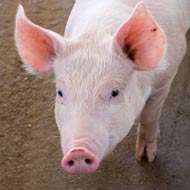H3N8 strains 'can go undetected in pigs'

"...it is not difficult to imagine that [H3N8] could be a candidate for future outbreaks."
Scientists have discovered that two different strains of the H3N8 influenza A virus are able to infect and replicate in pigs. What's more, the preferred test is ineffective for detecting these strains in pigs.
Lead author Dr Maria Montoya from the Pirbright Institute said H3N8 could be a candidate for future outbreaks in humans.
"It has been shown that the H1N1 strain that caused the 2009 flu pandemic had been previously circulating in the pig population," she explained.
"With H3N8 acting as a sneaky virus in pigs and able to go undetected through standard testing, then it is not difficult to imagine that it could be a candidate for future outbreaks."
The research, which has been published in the Journal of Virology, aimed to find out if H3N8 influenza A viruses from different hosts could cross the species barrier.
Scientists carried out in vitro experiments alongside an experimental infection in pigs, using four H3N8 viruses from different origins - equine, canine, avian and seal.
While the equine and canine viruses showed little ability to replicate in pigs, the avian and seal viruses replicated substantially.
In addition, the Haemagglutination inhibition (HAI) test used to detect flu in livestock, was ineffective in detecting these strains in porcine hosts.
Dr Montoya said: "Our study demonstrates that not only does H3N8 influenza A virus from seals and wild aquatic birds have the potential to cross the species barrier and establish successful infections in pigs, it might also spread unnoticed with HAI being the favoured diagnostic tool for this virus."
When researchers sequenced the virus strains used in the study the mutations they found were unknown. The team said more work needs to be done to find out if these new mutations have a role in enabling mammalian infection.
H3 viruses - particularly H3N8 - are known to be highly adaptive as they are found in multiple avian and mammal hosts. As humans are more closely related to pigs than other livestock carriers, it is a cause for concern when avian strains come together and reassort with pig strains - creating a highly pathogenic virus that is more able to infect humans.



 The Animal and Plant Health Agency (APHA) has updated its online reporting service for dead wild birds.
The Animal and Plant Health Agency (APHA) has updated its online reporting service for dead wild birds.